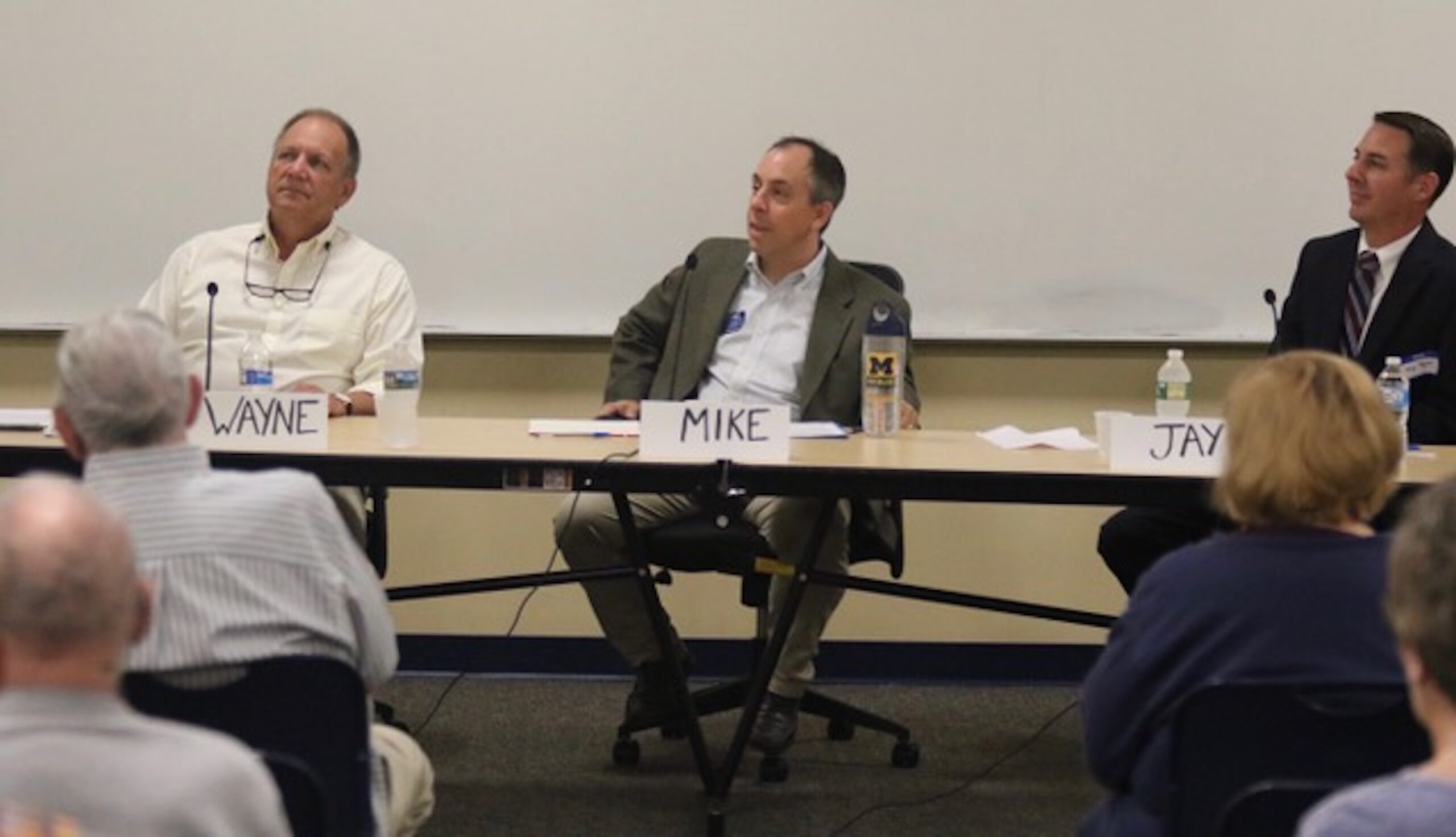Government spending, a new public library project and the local impact of New Jersey officials possibly legalizing recreational marijuana emerged as some of the issues the three hopefuls for Township Committee weighed in on at a candidates forum Oct. 9, less than a month before the election.
Democratic incumbents Jay Taylor and Michael J. Ferrante and Republican challenger Wayne Wittman spent two hours before approximately 100 voters at the annual Woman’s Club of Cranbury candidates night in the large group room at Cranbury School.
At a time when state officials are considering legalizing recreational marijuana, Wittman said he opposed allowing a recreational marijuana shop in a residential zone. He offered that once a law is put out, he would prefer to have a voter referendum on the issue.
“I’m going to leave that up to the town of Cranbury to decide this one,” he said.
Ferrante said he “would support zoning or other regulations that would prohibit or restrict that happening in our town to the limit of the restriction of what the state puts on that.”
The Township Committee, in advance of any law change, voted in March to prohibit the retail sale of marijuana locally, a measure Taylor backed. Cranbury is already home to a medical marijuana dispensary.
“Medical marijuana is controlled, it’s no different to me than CVS or Rite Aid,” Taylor said. “But I do not agree with the idea of retail marijuana in the community.”
Of the possibility of Cranbury merging with another municipality, all the candidates agreed it was a bad idea. Taylor said the state is “pushing” to consolidate towns like Cranbury.
“I want to fight consolidation,” Taylor said.
“I hope everybody, no matter who gets on this board, will stand with the board in the future to fight any consolidation of our community into an adjacent community,” Wittman said. “We all worked way too hard to bring in the industrial base, preserve our farmland and keep taxes as low as possible to give that away to an adjacent community.”
Ferrante called for defending against consolidation.
“I don’t suggest we can do better than what we’ve done and I would strongly fight consolidation,” he said.
Taylor has served on the governing body for nine years. He sought to show how, during that time, the township’s financial position has improved: municipal spending is down, debt is $10 million less than in 2007 and the municipal coffers have a healthy surplus.
He said officials “focused on needs, not wants.”
Going forward, he proposed returning a portion of the surplus in the form of tax relief and retiring more municipal debt.
“I’ve sat here and we have preserved over 400 acres of farmland,” Taylor said. “We need to continue to look at how we preserve our community and our history.”
In November, voters will select two members of the five-member Township Committee. Wittman originally had a running mate, Nancy Witt, who quit the race shortly after winning the uncontested GOP primary. Her absence means Democrats will hold on to control of the governing body, no matter the outcome of the voting on Nov. 6. At the moment, Democrats hold a 4-1 advantage.
At best, Republicans can pick up one of the two seats up for grabs if Wittman succeeds in his political comeback. The former township committeeman spent nine years on the governing body in the 1990s and the 2000s, including a stint at mayor.
In his remarks, Wittman said he is running for office again “because I think we can do a better job at making Cranbury a safe place to travel, work and play.”
He also touched on the need “to build a sustainable Cranbury” in terms of the community’s population base to “keep school taxes low.”
“Because if we have an influx of 200 or 300 people or more in this community, that could be a tipping point where we might have to do something a little bit that we don’t want to with the school system,” he said.
Ferrante, a former Cranbury school board member, filled a vacant seat on the governing body in April, after Committeeman David Cook resigned. Ferrante also has served on the Cranbury Library Foundation, and helped to lead a capital campaign to raise $2.5 million to construct a new library.
“This will provide an anchor facility for a vibrant downtown area and a center for education and learning,” Ferrante said.
Officials are looking to obtain a state grant to help pay for the project, but if that effort fails, Ferrante said officials would “need to finish this as a township capital project.”
On that point, Taylor disagreed. He said the town has $33 million in “available credit,” but it has roughly $41 million in “future capital needs” that include road repairs and dredging Brainerd Lake.
“We don’t have the luxury, unfortunately, of being able to take on the debt for a library,” Taylor said.
Wittman said he has committed to library officials “that if the funding doesn’t come through, we need to come up with a plan B.” He said he does not know what that option would look like.
Municipal officials have already donated the land for the project and pledged to pay for the parking lot.

